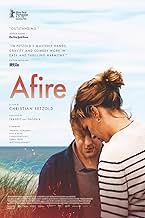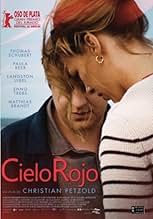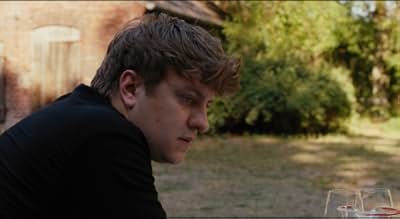VALUTAZIONE IMDb
7,1/10
10.169
LA TUA VALUTAZIONE
Un gruppo di amici si trova in una casa per le vacanze sul Mar Baltico dove le emozioni aumentano mentre la foresta arida intorno a loro prende fuoco.Un gruppo di amici si trova in una casa per le vacanze sul Mar Baltico dove le emozioni aumentano mentre la foresta arida intorno a loro prende fuoco.Un gruppo di amici si trova in una casa per le vacanze sul Mar Baltico dove le emozioni aumentano mentre la foresta arida intorno a loro prende fuoco.
- Premi
- 10 vittorie e 28 candidature totali
Recensioni in evidenza
"Leon" (Thomas Schubert) and his friend "Felix" (Langston Uibel) head to a remote rural cottage near the Baltic coast so the former man can put the finishing touches to his novel before a visit from his publisher (Matthias Brandt). They arrive, though, and discover that "Nadja" (Paula Beer) is already staying - and this upsets the apple cart a bit. "Leon" quickly becomes obsessed - and that only gets worse when her nocturnal activities with life guard "Devid" (Enno Trebs) and some wafer thin walls force him to sleep in the garden amongst the mosquitoes. What now ensues is quite an intricately constructed observational presentation that looks at the evolving dynamic between the four - and it doesn't pan out as you might expect, especially once it becomes clear that his latest literary work is nobody's idea of a magnum opus. The characterisations here have a fluidity to them that makes for quite an interesting watch. None of them could ever be described as beautiful - in any classical sense - so the story is much more about their traits, flaws and foibles than about their looks. That works up to a point, but there was too much missing from the puzzle for me to really find myself engaged with any of them. The last twenty minutes - set amidst some lethal forest fires - was rushed and seemed to me indicative that "Leon" wasn't the only one who'd suffered from a writer's block! The photography is effectively intimate at times but at other times we see just too many shots walking to and from the beach (and the constant buzzing of the mozzies got on my nerves a bit, too, after a while!). I did quite enjoy this, but somehow it just lacked substance before a conclusion that just seemed to be unnecessarily ghastly. Give it a go, though...
This had potential, there is a good movie inside this movie, just not the one i watched.
It's like this movie has a beginning and an end but not anything in between. This want to be a "character study" but there is not a smooth transition in this leading character's development: He is always immature and suddenly he supposedly has an epiphany. There is no chemistry between him and Nadja, are we suppose to believe that she is attracted to him? Why? How? And the ending is just lazy writing. Symbolisms are naive. And it's "easy". Big events are easy. A more lowkey approach would be better.
Having said that, this is a somewhat good slowburn drama, not a "heavy" drama, neither a comedy as it labelled. I loved the song. Kinda interesting, some intense moments, subtle and well acted. As another reviewer mentioned, "That works up to a point, but there was too much missing from the puzzle for me to really find myself engaged with any of them".
It's like this movie has a beginning and an end but not anything in between. This want to be a "character study" but there is not a smooth transition in this leading character's development: He is always immature and suddenly he supposedly has an epiphany. There is no chemistry between him and Nadja, are we suppose to believe that she is attracted to him? Why? How? And the ending is just lazy writing. Symbolisms are naive. And it's "easy". Big events are easy. A more lowkey approach would be better.
Having said that, this is a somewhat good slowburn drama, not a "heavy" drama, neither a comedy as it labelled. I loved the song. Kinda interesting, some intense moments, subtle and well acted. As another reviewer mentioned, "That works up to a point, but there was too much missing from the puzzle for me to really find myself engaged with any of them".
Director Christian Petzold (PHOENIX, TRANSIT) appears to be in a slightly different mode at first with his latest, AFIRE. Four people gather at a seemingly idyllic summer retreat in the Baltics.
The home is owned by the family of Felix (Langston Uibel). He and his friend Leon (Thomas Schubert) discover that a young woman has sublet a bedroom as well, Nadja (played by Petzhold regular, Paula Beer). A local lifeguard Deved (Enno Trebs) completes the quartet. Leon is there to work on a rewrite of his novel, while Felix is completing a portfolio of photographs.
Petzold has said that he found inspiration in the work of Eric Rohmer and one can certainly see the influence as the characters go through their paces and engage in barbed conversations and behaviors. The original German title translates roughly as 'Red Skies' and refers to the crimson glow from nearby forest fires in the region.
Petzold's script takes a bit to come into focus and is impeded by the character of Leon, a petulant sort who is neither sympathetic nor particular interesting for much of the action. Schubert's performance similarly is off-putting at first and never quite makes him worthy of much investment. Fortunately, Beer is her dependable self and keeps the film moving along, all the while revealing layers of her character. Uibel and Trebs are fine as is Matthias Brandt as Leon's literary editor.
AFIRE has an appropriate denouement (if a bit on the nose) and Petzhold delivers one last mischievous wink to the viewer.
The home is owned by the family of Felix (Langston Uibel). He and his friend Leon (Thomas Schubert) discover that a young woman has sublet a bedroom as well, Nadja (played by Petzhold regular, Paula Beer). A local lifeguard Deved (Enno Trebs) completes the quartet. Leon is there to work on a rewrite of his novel, while Felix is completing a portfolio of photographs.
Petzold has said that he found inspiration in the work of Eric Rohmer and one can certainly see the influence as the characters go through their paces and engage in barbed conversations and behaviors. The original German title translates roughly as 'Red Skies' and refers to the crimson glow from nearby forest fires in the region.
Petzold's script takes a bit to come into focus and is impeded by the character of Leon, a petulant sort who is neither sympathetic nor particular interesting for much of the action. Schubert's performance similarly is off-putting at first and never quite makes him worthy of much investment. Fortunately, Beer is her dependable self and keeps the film moving along, all the while revealing layers of her character. Uibel and Trebs are fine as is Matthias Brandt as Leon's literary editor.
AFIRE has an appropriate denouement (if a bit on the nose) and Petzhold delivers one last mischievous wink to the viewer.
Leon and Felix, two young men with work to do, head to a family cottage to complete their tasks. But a beautiful interloper upsets their plans.
It's a familiar set up, given a memorable outing in Lynn Shelton's 'Your Sister's Sister.' The remote setting, the unexpected third wheel, sexual tension, secrets and lies - all the familiar elements are here. There is lots to admire about Afire, most notably the performances from Paul Beer as Nadja, Langston Uibel as Felix, Enno Trebs as Devid and Matthias Brandt as Helmut, a character who arrives late but has a very interesting narrative arc. Ultimately, however, the film fails to deliver a satisfying emotional climax. The tension between Leon and Nadja seems forced, resulting from some unpolished plot manoeuvres. Why does Nadja not reveal her literary background? How can she just 'turn up' in the bedroom with Leon? The main misfire, however, is the casting of Thomas Schubert as Leon. He just never convinces as tortured writer, a character type exemplified by Paul Giamatti in Sideways. It is a puzzling error, given that the other characters are so well cast.
The sound design also slightly annoys by making the buzzing of insects prominent. It is presumably done to put us 'inside' of Leon's discomfort, but it is merely irritating.
The ending felt like it was missing a layer. The turnaround in Leon's fortunes is a nice touch, but I expected to hear that his story was pure fiction inspired by the events, and that the tragedy he relays in his prose had not, in fact, taken place. But the script did not take that step, and that feels like a missed opportunity. Leon is more interested in rekindling a romance than grieving for a friend, and that made me dislike him.
There are many good elements here. Nadja is intriguing and likable, and the romance that blossoms between two characters was unexpected and surprising. The approaching fire is a nice literal and figurative touch. Afire is worth checking out, but it feels like is could have been so much more than it is.
It's a familiar set up, given a memorable outing in Lynn Shelton's 'Your Sister's Sister.' The remote setting, the unexpected third wheel, sexual tension, secrets and lies - all the familiar elements are here. There is lots to admire about Afire, most notably the performances from Paul Beer as Nadja, Langston Uibel as Felix, Enno Trebs as Devid and Matthias Brandt as Helmut, a character who arrives late but has a very interesting narrative arc. Ultimately, however, the film fails to deliver a satisfying emotional climax. The tension between Leon and Nadja seems forced, resulting from some unpolished plot manoeuvres. Why does Nadja not reveal her literary background? How can she just 'turn up' in the bedroom with Leon? The main misfire, however, is the casting of Thomas Schubert as Leon. He just never convinces as tortured writer, a character type exemplified by Paul Giamatti in Sideways. It is a puzzling error, given that the other characters are so well cast.
The sound design also slightly annoys by making the buzzing of insects prominent. It is presumably done to put us 'inside' of Leon's discomfort, but it is merely irritating.
The ending felt like it was missing a layer. The turnaround in Leon's fortunes is a nice touch, but I expected to hear that his story was pure fiction inspired by the events, and that the tragedy he relays in his prose had not, in fact, taken place. But the script did not take that step, and that feels like a missed opportunity. Leon is more interested in rekindling a romance than grieving for a friend, and that made me dislike him.
There are many good elements here. Nadja is intriguing and likable, and the romance that blossoms between two characters was unexpected and surprising. The approaching fire is a nice literal and figurative touch. Afire is worth checking out, but it feels like is could have been so much more than it is.
In interviews director Christian Petzold gave in connection with the release of "Roter Himmel" he said that he was inspired by French summer / coming of age films from for example Eric Rohmer. According to Petzold this type of film had disappeared out of German cinema since "Menschen am Sonntag" (1930, Robert Siodmak, Edgar Ulmer and Rochus Gliese). "Roter Himmel" is indeed situated during summer, but that is where any comparison ends. The beginning of "Roter Himmel" is much more a parody on the American style coming of age films such as "The cabin in the woods" (2011, Drew Goddard) with a car breaking down in the woods and creepy animal noices thereafter.
"Barbara" (2012, Christian Petzold) was still an explicit political movie about living in the DDR. Since then the films of Petzold have remained socially concerned but have become more abstract. In "Undine" (2020) a water nymph symbolizes the element of water. In "Roter Himmel" forest fires sumbolizes the element of fire. It looks like Petzold has begun a series about the elements, just like Krzysztof Kieslowski made a series about the ideals of the French revolution in the 90's. We are looking forward to the next film.
Forst fires are unfortunately very actual in the summer of 2023. However these fires are not the main theme of the film. "Roter Himmel" is not an eco-drama. They remain on the background, at least that is what we and the characters in the film belief for (too) long.
The main character of the film is Leon (Thomas Schubert), a writer writing his second book and desperately trying to match the success of his first novel. He wraps his uncertainty in a cloak of arrogance and self esteem and in so doing gets estranged from the people around him. These people are for him more an obstacle for working undisturbed than a source of inspiration. When they go for a swim he always says that his work doesn't allow him to join them, only to waste his time when they are gone.
An important moment in the film comes when the publisher of Leon meets him to discuss the progress of his work. He doesn't like the manuscript, but he is very interested in what the people around Leon are doing. Will Leon's eyes finally open?
"Barbara" (2012, Christian Petzold) was still an explicit political movie about living in the DDR. Since then the films of Petzold have remained socially concerned but have become more abstract. In "Undine" (2020) a water nymph symbolizes the element of water. In "Roter Himmel" forest fires sumbolizes the element of fire. It looks like Petzold has begun a series about the elements, just like Krzysztof Kieslowski made a series about the ideals of the French revolution in the 90's. We are looking forward to the next film.
Forst fires are unfortunately very actual in the summer of 2023. However these fires are not the main theme of the film. "Roter Himmel" is not an eco-drama. They remain on the background, at least that is what we and the characters in the film belief for (too) long.
The main character of the film is Leon (Thomas Schubert), a writer writing his second book and desperately trying to match the success of his first novel. He wraps his uncertainty in a cloak of arrogance and self esteem and in so doing gets estranged from the people around him. These people are for him more an obstacle for working undisturbed than a source of inspiration. When they go for a swim he always says that his work doesn't allow him to join them, only to waste his time when they are gone.
An important moment in the film comes when the publisher of Leon meets him to discuss the progress of his work. He doesn't like the manuscript, but he is very interested in what the people around Leon are doing. Will Leon's eyes finally open?
Lo sapevi?
- QuizChristian Petzold binged the films of Éric Rohmer while developing this project.
- ConnessioniReferenced in Film Junk Podcast: Episode 929: Perfect Days + I.S.S. (2024)
- Colonne sonoreIn My Mind
Performed by Wallners
I più visti
Accedi per valutare e creare un elenco di titoli salvati per ottenere consigli personalizzati
- How long is Afire?Powered by Alexa
Dettagli
Botteghino
- Lordo Stati Uniti e Canada
- 244.803 USD
- Fine settimana di apertura Stati Uniti e Canada
- 38.485 USD
- 16 lug 2023
- Lordo in tutto il mondo
- 2.295.497 USD
- Tempo di esecuzione
- 1h 42min(102 min)
- Colore
- Proporzioni
- 1.85 : 1
Contribuisci a questa pagina
Suggerisci una modifica o aggiungi i contenuti mancanti


























